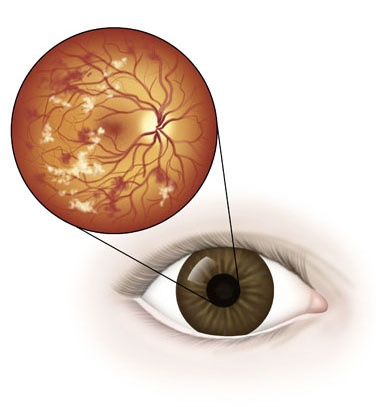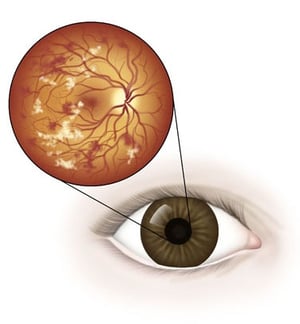Common Eye Problems and What to Know About Them
Most of us take our eyesight for granted, that is until we start noticing changes and seek the advice of an optometrist. While eye problems can...
3 min read
 The Rochester Eye & Laser Team
:
Feb 2, 2021 2:27:19 PM
The Rochester Eye & Laser Team
:
Feb 2, 2021 2:27:19 PM

 Diabetes is a disease that profoundly affects many areas of your body, including your eyes. It increases your risk for eye conditions, such as glaucoma and cataracts. The primary concern for eye health in people with diabetes is the development of diabetic retinopathy.
Diabetes is a disease that profoundly affects many areas of your body, including your eyes. It increases your risk for eye conditions, such as glaucoma and cataracts. The primary concern for eye health in people with diabetes is the development of diabetic retinopathy.
Diabetic retinopathy is a condition that develops when the blood vessels in your retina become damaged. The retina is the light-sensitive portion of the back of your eye. As the damage worsens, you may begin losing your vision. Your eyesight may become blurry, less intense, and begin to disappear.
This condition can affect people with type 1 or type 2 diabetes. The longer you live with diabetes, the more likely you are to develop complications like diabetic retinopathy. This is why adopting lifestyle changes and learning to manage diabetes is so important.
In its earliest stages, diabetic retinopathy may cause no symptoms. The initial symptoms may be barely noticeable or mild. Over time, the condition can worsen and lead to partial and then complete blindness.
You should see your doctor if you experience any of these symptoms:
Diabetic retinopathy most often affects both eyes at the same time and in equal measure. If you’re experiencing issues with only one eye, it doesn’t mean you don’t have diabetic retinopathy. However, it might indicate another eye issue. Make an appointment to see your doctor to find an appropriate treatment plan.
The buildup of excess sugar in your blood can lead to a number of health issues. In your eyes, too much glucose can damage the tiny vessels that supply blood to your retina. Over time, this damage may block your blood flow.
Chronic damage to retinal blood vessels affects your vision. When your blood flow is diminished, your eye attempts to fix the situation by growing new blood vessels. The process of growing new blood vessels is called neovascularization. These vessels aren’t as effective or as strong as the original ones. They may leak or rupture, which can negatively impact your vision.
Diabetic retinopathy is a concern for anyone who has diabetes. There are additional risk factors for developing diabetic retinopathy:
Women who are pregnant and have diabetes may experience more issues with diabetic retinopathy than women who have diabetes and aren’t pregnant. Your doctor may suggest that you have additional eye exams during your pregnancy.
The longer you have diabetes, the greater your risk of complications, including diabetic retinopathy.
Your risks for developing complications are higher if your diabetes isn’t under control. Strict glycemic control is the most effective tool in preventing diabetic retinopathy. Early detection and working closely with your doctor to manage your diabetes is important.
Other medical conditions or diseases may also increase your risk of developing retinopathy. They include high blood pressure, heart disease, and high cholesterol.
African-Americans and Hispanics have a greater risk of developing diabetic retinopathy than the general population.
People with diabetes who smoke are more likely to develop retinopathy.
The best way to reduce the effects of diabetes on your eyes and the rest of your body is to control your blood sugar levels and maintain a healthier lifestyle. You can do the following to help prevent vision loss and other complications from diabetes:
Talk to your doctor if you’re having difficulty losing weight or quitting smoking. They can help you develop a treatment plan. Your doctor may also refer you to a dietician who can help you develop a diet that promotes weight loss and a healthy lifestyle.

Most of us take our eyesight for granted, that is until we start noticing changes and seek the advice of an optometrist. While eye problems can...

We all rub our eyes when we are tired, or frustrated, or just out of habit. Knowing what happens when you do it and how you can get rid of this bad...

Imagine this: a cold Saturday afternoon with no more holiday chores to check off of your to-do list. You have no plans, no responsibilities, nothing...